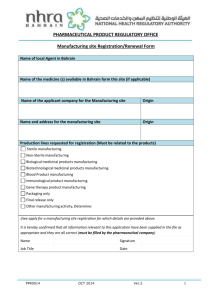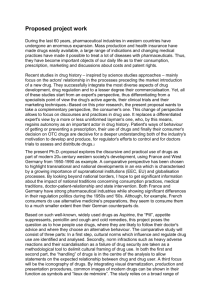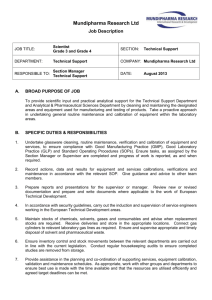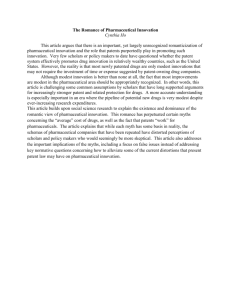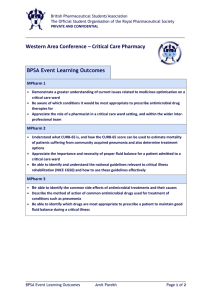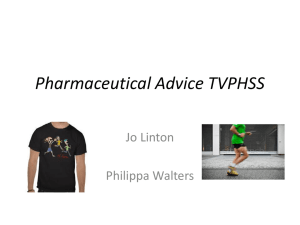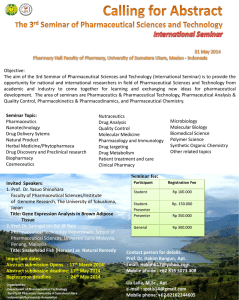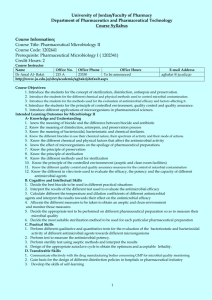module aims, assessment and support
advertisement
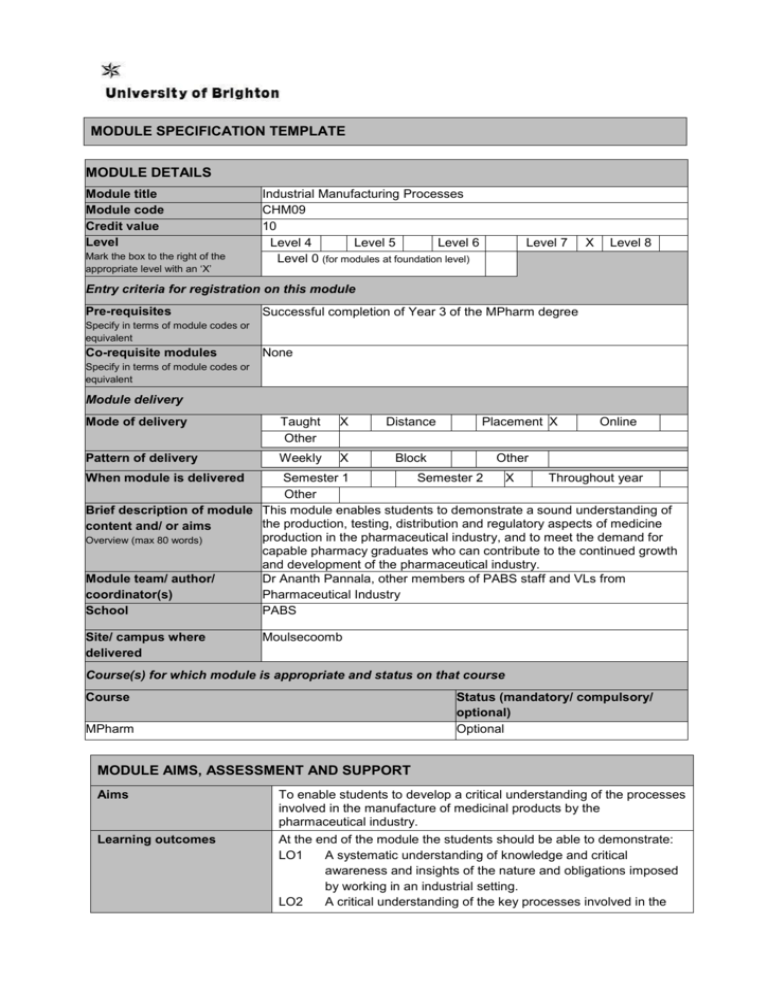
MODULE SPECIFICATION TEMPLATE MODULE DETAILS Module title Module code Credit value Level Mark the box to the right of the appropriate level with an ‘X’ Industrial Manufacturing Processes CHM09 10 Level 4 Level 5 Level 6 Level 0 (for modules at foundation level) Level 7 X Level 8 Entry criteria for registration on this module Pre-requisites Successful completion of Year 3 of the MPharm degree Specify in terms of module codes or equivalent Co-requisite modules None Specify in terms of module codes or equivalent Module delivery Mode of delivery Taught Other X Distance Pattern of delivery Weekly X Block Placement X Online Other When module is delivered Semester 1 Semester 2 X Throughout year Other Brief description of module This module enables students to demonstrate a sound understanding of the production, testing, distribution and regulatory aspects of medicine content and/ or aims production in the pharmaceutical industry, and to meet the demand for Overview (max 80 words) capable pharmacy graduates who can contribute to the continued growth and development of the pharmaceutical industry. Module team/ author/ Dr Ananth Pannala, other members of PABS staff and VLs from coordinator(s) Pharmaceutical Industry School PABS Site/ campus where delivered Moulsecoomb Course(s) for which module is appropriate and status on that course Course Status (mandatory/ compulsory/ optional) Optional MPharm MODULE AIMS, ASSESSMENT AND SUPPORT Aims To enable students to develop a critical understanding of the processes involved in the manufacture of medicinal products by the pharmaceutical industry. Learning outcomes At the end of the module the students should be able to demonstrate: LO1 A systematic understanding of knowledge and critical awareness and insights of the nature and obligations imposed by working in an industrial setting. LO2 A critical understanding of the key processes involved in the LO3 Content procurement, storage and usage of the raw materials in pharmaceutical manufacturing of medicinal products Insight into complexity of the key processes in packaging medicinal products to enable them to comply with the Pharmaceutical Industry Quality requirements. The module will comprise of 8 hours of lectures and 18 hours of placement in an industrial setting. Indicative content will include: Learning support Basic guidelines of working in an industrial setting; nature and obligations imposed by working in an industrial setting; application of COSHH and standard operating protocols (SOPs) Processes involved in the procurement of raw materials from suppliers – both active pharmaceutical ingredients as well as excipients Production methodologies and the equipment used including installation qualification, performance qualification, operational qualification and validation. Regulatory processes for the manufacture of medicinal products (GMP). Formulation techniques, production methodologies or other scientific techniques associated with the chosen formulation type Quality management and quality systems management in the pharmaceutical industry Pharmaceutical packaging: materials, procedures, regulatory requirements, distribution and SOPs During their placements, the student will be referred to text books, SOPs and industrial regulations as appropriate to the specific work setting, in addition to relevant lecture material Text books (current editions): MHRA Rules and Guidance for Pharmaceutical Manufacturers and Distributors The Theory and Practice of Industrial Pharmacy, L Lachman, HA Lieberman and J Kanig, Lea and Febiger. Mossialos et al. (Eds): Regulating Pharmaceuticals in Europe: Striving for Efficiency, Equality and Quality. Open University Press. Rang: Drug Development and Development, Technology in Transition. Churchill-Livingstone. Sarker: Quality Systems and Controls for Pharmaceuticals. Wiley. Tobin & Walsh: Medical Product Regulatory Affairs: Pharmaceuticals, Diagnostics and Medical Devices, WileyBlackwell. Other information: Essential websites: EMEA (www.ema.europa.eu), FDA (www.fda.gov) and MHRA (www.mhra.gov.uk). Teaching and learning activities Details of teaching and learning activities Through a mixture of lectures, industrial visits, private study and assignments. 100 hours, approximately 8 hours of lectures, 18 hours of industrial placements (6 x 3 h placements), 74 hours private study including course work. Allocation of study hours (indicative) Study hours Where 10 credits = 100 learning hours SCHEDULED This is an indication of the number of hours students can expect to spend in scheduled teaching activities including lectures, seminars, tutorials, project supervision, demonstrations, practical classes and workshops, supervised time in workshops/ studios, fieldwork, external visits, and work-based learning. 8 GUIDED INDEPENDENT STUDY All students are expected to undertake guided independent study which includes wider reading/ practice, follow-up work, the completion of assessment tasks, and revisions. 74 The placement is a specific type of learning away from the University that is not work-based learning or a year abroad. PLACEMENT TOTAL STUDY HOURS 18 100 Assessment tasks Details of assessment for this module Types of assessment task1 3000 word written assignment. The topic of the assignment to be agreed between module leader and industrial contact. This could be, but is not limited to, a critical review of a particular process, or an analysis of a problem encountered in the production process. % weighting Indicative list of summative assessment tasks which lead to the award of credit or which are required for progression. WRITTEN Written exam COURSEWORK Written assignment/ essay, report, dissertation, portfolio, project output, set exercise PRACTICAL Oral assessment and presentation, practical skills assessment, set exercise (or indicate if component is pass/fail) 100 EXAMINATION INFORMATION Area examination board Chemistry and Pharmaceutical Sciences External examiners Name Position and institution Date appointed Date tenure ends Dr S Murdan Senior Lecturer, UCL School of Pharmacy 01/10/08 30/09/13 QUALITY ASSURANCE Date of first approval N/A Only complete where this is not the first version Date of last revision N/A Only complete where this is not the first version Date of approval for this version April 2013 Version number 1 Modules replaced N/A Specify codes of modules for which this is a replacement Available as free-standing module? Yes No 1 Set exercises, which assess the application of knowledge or analytical, problem-solving or evaluative skills, are included under the type of assessment most appropriate to the particular task. X
